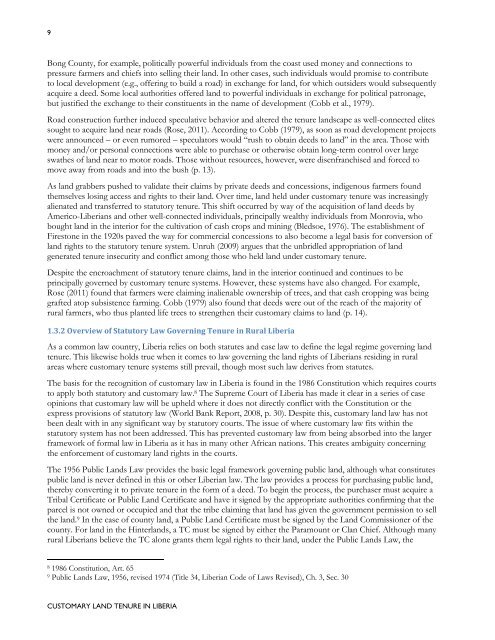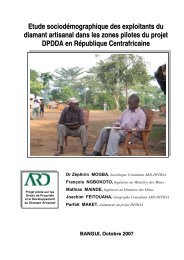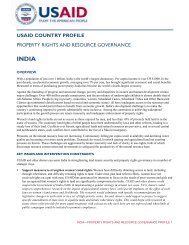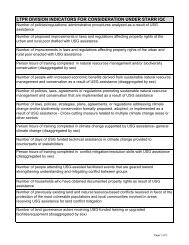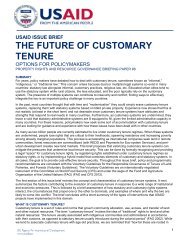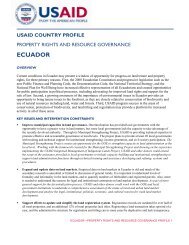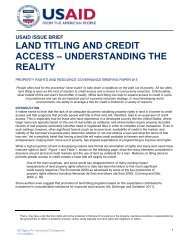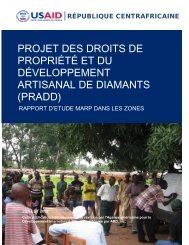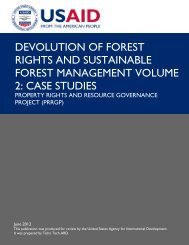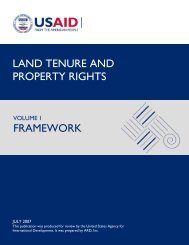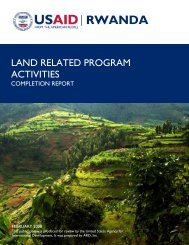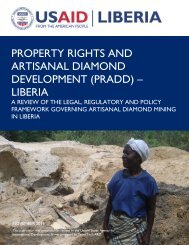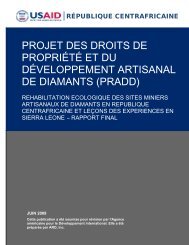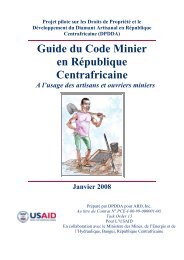Customary Land Tenure in Liberia - Land Tenure and Property ...
Customary Land Tenure in Liberia - Land Tenure and Property ...
Customary Land Tenure in Liberia - Land Tenure and Property ...
Create successful ePaper yourself
Turn your PDF publications into a flip-book with our unique Google optimized e-Paper software.
9<br />
Bong County, for example, politically powerful <strong>in</strong>dividuals from the coast used money <strong>and</strong> connections to<br />
pressure farmers <strong>and</strong> chiefs <strong>in</strong>to sell<strong>in</strong>g their l<strong>and</strong>. In other cases, such <strong>in</strong>dividuals would promise to contribute<br />
to local development (e.g., offer<strong>in</strong>g to build a road) <strong>in</strong> exchange for l<strong>and</strong>, for which outsiders would subsequently<br />
acquire a deed. Some local authorities offered l<strong>and</strong> to powerful <strong>in</strong>dividuals <strong>in</strong> exchange for political patronage,<br />
but justified the exchange to their constituents <strong>in</strong> the name of development (Cobb et al., 1979).<br />
Road construction further <strong>in</strong>duced speculative behavior <strong>and</strong> altered the tenure l<strong>and</strong>scape as well-connected elites<br />
sought to acquire l<strong>and</strong> near roads (Rose, 2011). Accord<strong>in</strong>g to Cobb (1979), as soon as road development projects<br />
were announced – or even rumored – speculators would “rush to obta<strong>in</strong> deeds to l<strong>and</strong>” <strong>in</strong> the area. Those with<br />
money <strong>and</strong>/or personal connections were able to purchase or otherwise obta<strong>in</strong> long-term control over large<br />
swathes of l<strong>and</strong> near to motor roads. Those without resources, however, were disenfranchised <strong>and</strong> forced to<br />
move away from roads <strong>and</strong> <strong>in</strong>to the bush (p. 13).<br />
As l<strong>and</strong> grabbers pushed to validate their claims by private deeds <strong>and</strong> concessions, <strong>in</strong>digenous farmers found<br />
themselves los<strong>in</strong>g access <strong>and</strong> rights to their l<strong>and</strong>. Over time, l<strong>and</strong> held under customary tenure was <strong>in</strong>creas<strong>in</strong>gly<br />
alienated <strong>and</strong> transferred to statutory tenure. This shift occurred by way of the acquisition of l<strong>and</strong> deeds by<br />
Americo-<strong>Liberia</strong>ns <strong>and</strong> other well-connected <strong>in</strong>dividuals, pr<strong>in</strong>cipally wealthy <strong>in</strong>dividuals from Monrovia, who<br />
bought l<strong>and</strong> <strong>in</strong> the <strong>in</strong>terior for the cultivation of cash crops <strong>and</strong> m<strong>in</strong><strong>in</strong>g (Bledsoe, 1976). The establishment of<br />
Firestone <strong>in</strong> the 1920s paved the way for commercial concessions to also become a legal basis for conversion of<br />
l<strong>and</strong> rights to the statutory tenure system. Unruh (2009) argues that the unbridled appropriation of l<strong>and</strong><br />
generated tenure <strong>in</strong>security <strong>and</strong> conflict among those who held l<strong>and</strong> under customary tenure.<br />
Despite the encroachment of statutory tenure claims, l<strong>and</strong> <strong>in</strong> the <strong>in</strong>terior cont<strong>in</strong>ued <strong>and</strong> cont<strong>in</strong>ues to be<br />
pr<strong>in</strong>cipally governed by customary tenure systems. However, these systems have also changed. For example,<br />
Rose (2011) found that farmers were claim<strong>in</strong>g <strong>in</strong>alienable ownership of trees, <strong>and</strong> that cash cropp<strong>in</strong>g was be<strong>in</strong>g<br />
grafted atop subsistence farm<strong>in</strong>g. Cobb (1979) also found that deeds were out of the reach of the majority of<br />
rural farmers, who thus planted life trees to strengthen their customary claims to l<strong>and</strong> (p. 14).<br />
1.3.2 Overview of Statutory Law Govern<strong>in</strong>g <strong>Tenure</strong> <strong>in</strong> Rural <strong>Liberia</strong><br />
As a common law country, <strong>Liberia</strong> relies on both statutes <strong>and</strong> case law to def<strong>in</strong>e the legal regime govern<strong>in</strong>g l<strong>and</strong><br />
tenure. This likewise holds true when it comes to law govern<strong>in</strong>g the l<strong>and</strong> rights of <strong>Liberia</strong>ns resid<strong>in</strong>g <strong>in</strong> rural<br />
areas where customary tenure systems still prevail, though most such law derives from statutes.<br />
The basis for the recognition of customary law <strong>in</strong> <strong>Liberia</strong> is found <strong>in</strong> the 1986 Constitution which requires courts<br />
to apply both statutory <strong>and</strong> customary law. 8 The Supreme Court of <strong>Liberia</strong> has made it clear <strong>in</strong> a series of case<br />
op<strong>in</strong>ions that customary law will be upheld where it does not directly conflict with the Constitution or the<br />
express provisions of statutory law (World Bank Report, 2008, p. 30). Despite this, customary l<strong>and</strong> law has not<br />
been dealt with <strong>in</strong> any significant way by statutory courts. The issue of where customary law fits with<strong>in</strong> the<br />
statutory system has not been addressed. This has prevented customary law from be<strong>in</strong>g absorbed <strong>in</strong>to the larger<br />
framework of formal law <strong>in</strong> <strong>Liberia</strong> as it has <strong>in</strong> many other African nations. This creates ambiguity concern<strong>in</strong>g<br />
the enforcement of customary l<strong>and</strong> rights <strong>in</strong> the courts.<br />
The 1956 Public <strong>L<strong>and</strong></strong>s Law provides the basic legal framework govern<strong>in</strong>g public l<strong>and</strong>, although what constitutes<br />
public l<strong>and</strong> is never def<strong>in</strong>ed <strong>in</strong> this or other <strong>Liberia</strong>n law. The law provides a process for purchas<strong>in</strong>g public l<strong>and</strong>,<br />
thereby convert<strong>in</strong>g it to private tenure <strong>in</strong> the form of a deed. To beg<strong>in</strong> the process, the purchaser must acquire a<br />
Tribal Certificate or Public <strong>L<strong>and</strong></strong> Certificate <strong>and</strong> have it signed by the appropriate authorities confirm<strong>in</strong>g that the<br />
parcel is not owned or occupied <strong>and</strong> that the tribe claim<strong>in</strong>g that l<strong>and</strong> has given the government permission to sell<br />
the l<strong>and</strong>. 9 In the case of county l<strong>and</strong>, a Public <strong>L<strong>and</strong></strong> Certificate must be signed by the <strong>L<strong>and</strong></strong> Commissioner of the<br />
county. For l<strong>and</strong> <strong>in</strong> the H<strong>in</strong>terl<strong>and</strong>s, a TC must be signed by either the Paramount or Clan Chief. Although many<br />
rural <strong>Liberia</strong>ns believe the TC alone grants them legal rights to their l<strong>and</strong>, under the Public <strong>L<strong>and</strong></strong>s Law, the<br />
8 1986 Constitution, Art. 65<br />
9 Public <strong>L<strong>and</strong></strong>s Law, 1956, revised 1974 (Title 34, <strong>Liberia</strong>n Code of Laws Revised), Ch. 3, Sec. 30<br />
CUSTOMARY LAND TENURE IN LIBERIA


